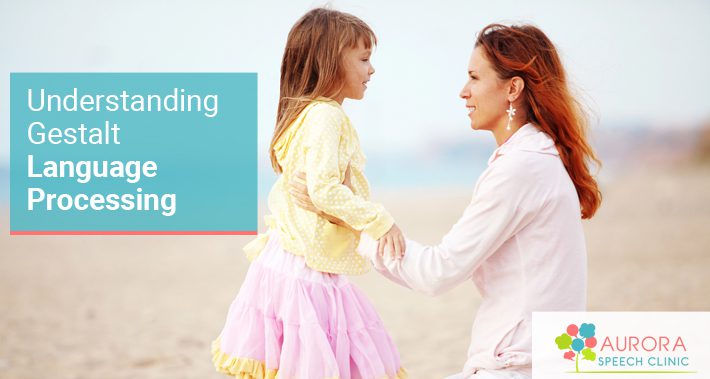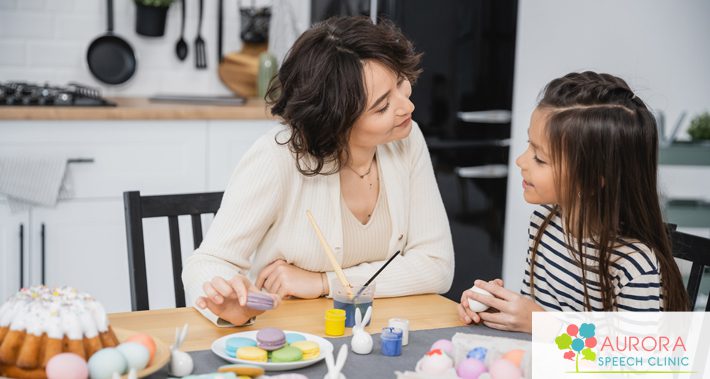
As parents, we are constantly amazed by the way our children learn and understand language.
From the time they begin to babble to their first words and sentences, the journey of language development is both fascinating and complex.
You may have heard terms like “gestalt language processing” and “analytic language processing” in discussions about language development, but what do they really mean?
And how can a speech therapist help your child navigate these different ways of learning language?
Here at Aurora Speech Clinic, our team of pediatric therapists includes those with a special interest in gestalt language processing.
Today on our speech therapy blog, we take a look at gestalt language processing, and how our speech therapy clinic can help.
Analytic vs Gestalt Language Learning
Broadly speaking, there are two different models of learning language – analytic and gestalt.
With analytic language learning, your child will learn individual words and what they mean.
From there, they can begin to string rudimentary phrases and sentences together.
For example, your child may learn the word “ball,” “red,” and “big” separate from each other.
When presented with a big red ball, though, they may recognize how all these words apply to it and then combine them to describe the ball.
Analytic language learning is the most common model of language learning – most children learn language this way.
Gestalt language learning, however, is different.
Gestalt is a word that originally comes from German.
It emphasizes the notion that the whole is greater than the sum of its parts.
Gestalt language learners will learn full phrases first and then begin to understand the meaning of the individual words within the phrase.
For example, your child might hear you say “That’s a big red ball,” and start applying this to every ball they see.
This process is called echolalia, and the phrases they repeat are called gestalts.
From there, your child will learn to break the gestalts they learn down into their individual words, which they can then use to build their own original sentences.
How Can You Tell If Your Child Is A Gestalt Language Learner?
Most children are analytic language learners.
As a result, the signs of an analytic language learner are easier to spot.
An analytic language learner will learn words one at a time, and from there combine them into phrases, then sentences.
The easiest way to tell if your child is a gestalt language learner is to watch them imitating phrases they’ve heard.
It may, at first, seem like your child is learning language at an advanced rate for their age.
But being a gestalt language learner doesn’t imply your child is any more or less advanced than their peers.
Instead, their speech and language developmental milestones are just different.
Their language learning may progress as follows:
- Delayed echolalia: scripting whole gestalts that may not seem to be relevant in every situation
- Partial gestalts: using parts of gestalts and mixing parts of different gestalts together
- Single words: recognizing individual words within their gestalts, and assembling two word phrases
- Full original sentences: creating their own sentences independent of their gestalts and learning how grammar works
Is Gestalt Language Learning An Autistic Trait?
Autistic children are more likely to be gestalt language learners.
Most research done on gestalt language learners is done in relation to autism.
However, not all gestalt language learners are autistic.
As well, not all autistic children are gestalt language learners.
That said, if your child is a gestalt language learner, it is recommended to have them screened by a speech-language pathologist.
RELATED: Speech Therapy for Autism Spectrum Disorder
Do Gestalt Language Learners Need Speech Therapy?
Not all gestalt language processors will need speech therapy.
However, but if you notice your child isn’t developing their language skills the way you expect, or you notice they are not effectively communicating their wants, needs, feelings and ideas, speech therapy can help.
As children develop their language skills, speech therapy can help them transition from using gestalts to generating sentences of their own.
Therapy is generally most effective when it is play-based and follows the child’s lead and interests.
Your pediatric speech therapist will give you the tools you need to help your child develop their speech and language skills.

Tips For Parents Of Gestalt Language Learners
If your child is a gestalt language learner, there are things you as a parent can do to help them along as they build their language skills.
Let’s take a look at some of them below.
1. Listen For What They Mean, Not What They’re Saying
As a parent, it may be confusing at first when your child says something to you that doesn’t seem relevant to the situation.
But once you recognize these for what they are – gestalts – you can begin to interpret them for your child.
For example, your child may say “That’s a big red ball” when they want to play outside, if they’ve made that association.
They may also say a line from a book you recently read to them, which could indicate they’d like you to read them a story.
Identifying the gestalts your child has picked up and the potential underlying message will help you better understand them.
Once you recognize their gestalts and what they mean, it can help to respond to them with that in mind.
2. Don’t Ignore Their Gestalts
It’s important to recognize gestalts for what they are – attempts to communicate.
At first, you might not fully understand them.
But that’s true of all kids as they learn to talk.
Remember – just because you don’t understand their gestalts doesn’t mean they’re meaningless.
Always acknowledge any attempts at communication.
3. Model, Don’t Correct
It may seem like your child is making mistakes as they speak using gestalts.
But they’re not errors, they’re just normal parts of speech development for a gestalt language learner.
Rather than trying to correct them, it’s more effective to model the language you use.
This might include using simpler language when you speak to your child.
You can also repeat their gestalts to help them recognize that you understand them.
Breaking sentences down into smaller chunks can help your child understand the individual words.
4. Minimize Questions
Parents tend to think that asking their children questions will help them learn new words.
This strategy is not necessarily helpful for any children learning to talk (another blog post on that later), but can be especially confusing for gestalt language processors.
Instead of asking, point to the dog and say “a dog,” for example.
This is a more effective way to help them learn the meaning of words.
5. Give Your Child More Gestalts
When gestalt language processors learn language, they build a library of gestalts in their mind.
Teaching them more gestalts, and providing context, will give your child more opportunity to build their vocabulary.
Book Your Appointment With Aurora Speech Clinic Today
Do you think your child may be a gestalt language learner?
If so, we’re here to help.
Aurora Speech Clinic offers pediatric speech therapy in clinic, as well as via speech teletherapy.
Book your appointment with Aurora Speech Clinic today.
372 Hollandview Trail, #302,
Aurora, ON L4G 0A5
(905) 503-4321
» https://goo.gl/maps/fg3XKnNsczzwLzTz7
Aurora Speech Clinic is located in Aurora, ON and offers personalized skilled intervention to those struggling with their speech and language skills. Services offered include screening, consultation, and comprehensive evaluation. We also provide one-on-one and/or group therapy for speech sound disorders, receptive/expressive language delay/disorder, stuttering/cluttering, accent reduction, and much more.